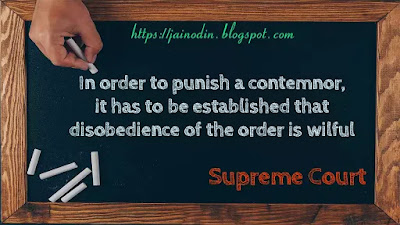The contours for initiating civil contempt action:
The contempt jurisdiction conferred on to the law courts power to punish an offender for his wilful disobedience/contumacious conduct or obstruction to them majesty of law, for the reason that respect and authority commanded by the courts of law are the greatest guarantee to an ordinary citizen that his rights shall be protected and the entire democratic fabric of the society will crumble down if the respect of the judiciary is undermined. Undoubtedly, the contempt jurisdiction is a powerful weapon in the hands of the courts of law but that by itself operates as a string of caution and unless, thus, otherwise satisfied beyond reasonable doubt, it would neither be fair nor reasonable for the law courts to exercise jurisdiction under the Act. Ther proceedings are quasi criminal in nature, and therefore, standard of proof required in these proceedings is beyond all reasonable doubt. It would rather be hazardous to impose sentence for contempt on the authorities in exercise of the contempt jurisdiction on mere probabilities.
(Vide V.G. Nigam v. Kedar Nath Gupta, (1992) 4 SCC 697, Chhotu Ram v. Urvashi Gulati, (2001) 7 SCC 530, Anil Ratan Sarkar v. Hirak Ghosh, (2002) 4 SCC 21, Bank of Baroda v. Sadruddin Hasan Daya, (2004) 1 SCC 360, Sahdeo v. State of U.P., (2010) 3 SCC 705 and National Fertilizers Ltd. v. Tuncay Alankus, (2013) 9 SCC 600.)
Thus, in order to punish a contemnor, it has to be established that disobedience of the order is “wilful”. The word “wilful” introduces a mental element and hence, requires looking into the mind of a person/contemnor by gauging his actions, which is an indication of one's state of mind. “Wilful” means knowingly intentional, conscious, calculated and deliberate with full knowledge of consequences flowing therefrom. It excludes casual, accidental, bona fide or unintentional acts or genuine inability. Wilful acts does not encompass involuntarily or negligent actions. The act has to be done with a “bad purpose or without justifiable excuse or stubbornly, obstinately or perversely”. Wilful act is to be distinguished from an act done carelessly, thoughtlessly, heedlessly or inadvertently. It does not include any act done negligently or involuntarily. The deliberate conduct of a person means that he knows what he is doing and intends to do the same. Therefore, there has to be a calculated action with evil motive on his part. Even if there is a disobedience of an order, but such disobedience is the result of some compelling circumstances under which it was not possible for the contemnor to comply with the order, the contemnor cannot be punished. “Committal or sequestration will not be ordered unless contempt involves a degree of default or misconduct.” (Vide S. Sundaram Pillai v. V.R. Pattabiraman, (1985) 1 SCC 591, Rakapalli Raja Ram Gopala Rao v. Naragani Govinda Sehararao, (1989) 4 SCC 255, Niaz Mohammad v. State of Haryana, (1994) 6 SCC 332, Chordia Automobiles v. S. Moosa, (2000) 3 SCC 282, Ashok Paper Kamgar Union v. Dharam Godha, (2003) 11 SCC 1, State of Orissa v. Mohd. Illiyas, (2006) 1 SCC 275 and Uniworth Textiles Ltd. v. CCE, (2013) 9 SCC 753.) [Para No.12]
{Reiterated in Ram Kishan vs. Tarun Bajaj (2014) 16 SCC 204}
Supreme Court of India
The workmen
Vs.
Rauthar Dawood Naseem
Decide on 19/04/2020

